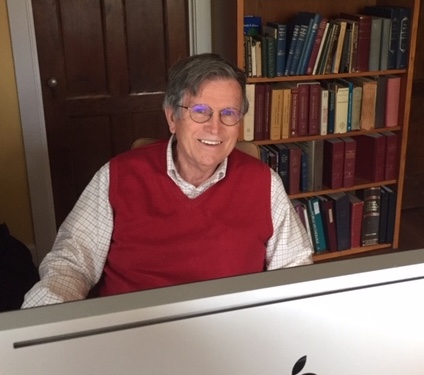Origins of the Gospels in Performance
Tom Boomershine

Even before we went into “sheltering at home” mode, I was staying home much of the time to compose an introduction for my new book. It is tentatively titled The Origins of the Gospels in Performance, and it is a collection of my published articles, from 1981 to 2018, on the Gospels in their original historical context.
The central thesis of performance criticism is that the Bible was a series of compositions of sound that were performed for audiences of predominantly illiterate persons. This stands in contrast to the present ubiquitous assumption that the Bible was a library of texts that were read by individual readers in silence.
The essays in my forthcoming book are initial probes, focused primarily on the four Gospels, that seek to identify the implications of the new paradigm of biblical study for the perception and interpretation of the Gospel tradition in the media culture of the ancient world.
My book will be published by Wipf & Stock in their Performance Criticism series. Look for it some time next year. We’ll let you know when it’s out.
Origins of Tom’s Study of the Gospel as Story
Here is an excerpt from Tom’s introduction that tells a piece of the story of how he came to study the Gospel as oral storytelling. It comes from Tom’s time pastoring in Chicago after receiving his M.Div. from Union in NYC.
I have a vivid memory of the day when I decided to experiment with reading the whole book of Mark aloud. I didn’t make it past the messianic confession before I fell asleep. My initial experiment convinced me that the medium of the Gospel was not a reader reading Mark aloud to himself.
However, a month or so later, I went to a black Baptist church down the street for worship. The preacher was a storytelling preacher. The sermon was over an hour and fifteen minutes! And at the end people were cheering for more. It was electric. He wove together stories from the Bible with a wide range of contemporary stories. I learned from that great preacher whose name I do not know that it was possible to hold an audience but only if it was in a far more animated manner than a manuscript reading.
This experience raised a foundational question: what was the medium of the Bible in its original historical context? It was clear that it was not silent reading. But I wondered about the style of the preacher as a window into the world of Mark. I returned to Union to do a Ph.D. in the storytelling traditions of early Christianity.
Lazarus & Lockdown
Amelia Boomershine

A term I first heard when I started leading biblical storytelling programs in prison was “lockdown” –everyone back to their cells, no movement in the corridors or yards. Now we hear that word applied to whole cities, states, even nations. For the time being, it’s a point of connection we share with those on the inside.
I was scheduled to tell the long story of Jesus’ raising Lazarus for worship at McKinley United Methodist Church on March 29. I volunteered to tell it because I had learned it years ago to tell in a Methodist Church in The Gambia–reportedly the oldest church on the continent of Africa. I looked forward to re-learning it and telling it at McKinley, where at least 95% of the congregation is of African descent.
But lockdown began here in Ohio mid-March, so that wasn’t going to happen. However, it certainly wasn’t wasted effort. Learning “The Raising of Lazarus” was a powerful experience during this particular Lent. Once I knew it by heart again, it became a focus for my daily meditation, so I’m grateful that I had the occasion to re-visit it. (More on the intersection of biblical storytelling and meditation next month.)
I guess these days we are all looking forward to the day when lockdown is lifted, and like Lazarus, we can come out of our tombs…er…homes. In the meantime, in this season of Easter, coinciding now with a season of global death, it is worth sitting with the question Jesus asked Martha:
“I am the resurrection and the life. Those who believe in me, even though they die, will live, and everyone who lives and believes in me will never die. Do you believe this?”
John 11:25-26 NRSV
Visit GoTell’s story-page dedicated to “The Raising of Lazarus” (John 11:1-45) with graphic, commentary, audio of Tom’s telling, and the story in episodes.
